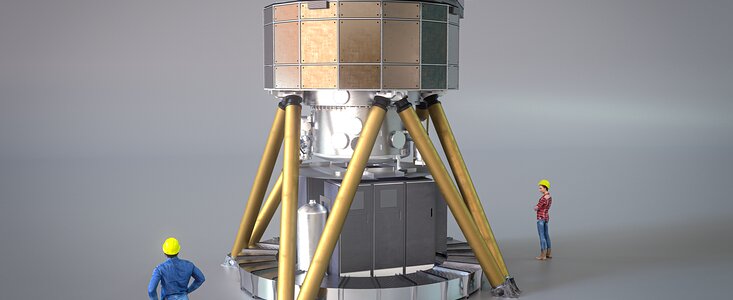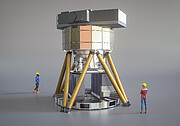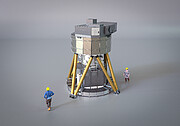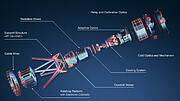Meddelelse
ELT MICADO instrument passes final design review
3. september 2024
The Multi-AO Imaging Camera for Deep Observations (MICADO), the powerful high-resolution camera for ESO’s Extremely Large Telescope (ELT), has passed its final design review, marking an important milestone on its road to operation later this decade. Once complete, MICADO will offer astronomers the ability to take images of the Universe at an unprecedented depth.
The purpose of this last part of the multi-stage final design review (FDR) was to provide a wrap-up of the design process that has been going on for several years. While manufacturing usually begins only after the FDR is passed, the green light for manufacturing many of its components and sub-systems was already given previously, to enable the MICADO project to continue progressing towards ELT’s first light. To complete the design review, members of the consortium worked with ESO staff to clarify the remaining open issues about the instrument design. The passing of this milestone will enable the MICADO consortium – a team of 150 people spread across six countries – to now focus fully on manufacturing and testing the instrument.
The design of MICADO has been driven by a desire for ultra-high precision and stability to reach the required high sensitivity, resolution, astrometric accuracy and wide-wavelength coverage. To achieve this in the ELT environment, MICADO will be supported above the instrument platform so that the light from the telescope can be relayed both to the adaptive optics system that corrects the atmospheric blurring, and into the cryostat. Here the optics and detectors are kept cool so they can work effectively at near-infrared wavelengths without interference from other sources of heat. The detailed functioning of the instrument is controlled by electronics, much of which is mounted just underneath; and the software will allow the users to perform their observations remotely.
This sophisticated design will allow MICADO to obtain high-resolution images of the Universe that reveal the detailed structures and formation mechanisms of distant galaxies and allow astronomers to study individual stars and stellar systems in nearby galaxies as well as planets and planet formation outside our solar system. In addition, MICADO will act as a uniquely powerful tool for exploring environments where gravitational forces are extremely strong, such as close to the supermassive black hole at the centre of our galaxy, the Milky Way.
After a few years of early science, MICADO’s capabilities will be strengthened by linking it to the Multiconjugate adaptive Optics Relay For ELT Observations (MORFEO). This instrument will allow MICADO to take sharper images across a larger field of view.
For a full summary of who built MICADO, how it works, and how it will reveal the Universe as never seen before, watch ‘Meet MICADO, a super-camera for the ELT!’
More Information
The MICADO consortium consists of MPE (Max-Planck-Institut für Extraterrestrische Physik, Germany), MPIA (Max-Planck-Institut für Astronomie, Germany), USM (Universitäts-Sternwarte München, Germany), IAG (Institute for Astrophysics of the Georg-August-Universität Göttingen, Germany), NOVA (Netherlands Research School for Astronomy represented by the University of Groningen, the University of Leiden, and the NOVA optical/infrared instrumentation group based at ASTRON in Dwingeloo, The Netherlands), INAF Istituto Nazionale di Astrofisica, CNRS/INSU (Centre National de la Recherche Scientifique/Institut National des Sciences de l’Univers represented by LESIA, GEPI, Division Technique de l'INSU, UTINAM/OSU THETA, LCF and IP2I/LMA, France), A* (an Austrian partnership represented by the University of Vienna, the University of Innsbruck, the University of Linz, and RICAM Linz, Austrian Academy of Sciences, Austria), and the Finnish Centre for Astronomy with ESO (FINCA), University of Turku, Finland.
The primary role of each consortium partner in the project is outlined at https://www.mpe.mpg.de/ir/micado.
Links
Kontakter
Mario Schweitzer
MICADO Project Manager at ESO
Email: Mario.Schweitzer@eso.org
Elena Valenti
MICADO Project Scientist at ESO
Email: Elena.Valenti@eso.org
Ulf Seemann
MICADO Project Engineer at ESO
Email: Ulf.Seemann@eso.org
Ric Davies
MICADO Principal Investigator
Max Planck Institute for Extraterrestrial Physics, Germany
Email: davies@mpe.mpg.de
Eckhard Sturm
MICADO Project Manager
Max Planck Institute for Extraterrestrial Physics, Germany
Email: sturm@mpe.mpg.de
Bárbara Ferreira
ESO Media Manager
Garching bei München, Germany
Tel: +49 89 3200 6670
Email: press@eso.org
Om meddelelsen
| Id: | ann24013 |
Our use of Cookies
We use cookies that are essential for accessing our websites and using our services. We also use cookies to analyse, measure and improve our websites’ performance, to enable content sharing via social media and to display media content hosted on third-party platforms.
ESO Cookies Policy
The European Organisation for Astronomical Research in the Southern Hemisphere (ESO) is the pre-eminent intergovernmental science and technology organisation in astronomy. It carries out an ambitious programme focused on the design, construction and operation of powerful ground-based observing facilities for astronomy.
This Cookies Policy is intended to provide clarity by outlining the cookies used on the ESO public websites, their functions, the options you have for controlling them, and the ways you can contact us for additional details.
What are cookies?
Cookies are small pieces of data stored on your device by websites you visit. They serve various purposes, such as remembering login credentials and preferences and enhance your browsing experience.
Categories of cookies we use
Essential cookies (always active): These cookies are strictly necessary for the proper functioning of our website. Without these cookies, the website cannot operate correctly, and certain services, such as logging in or accessing secure areas, may not be available; because they are essential for the website’s operation, they cannot be disabled.
Functional Cookies: These cookies enhance your browsing experience by enabling additional features and personalization, such as remembering your preferences and settings. While not strictly necessary for the website to function, they improve usability and convenience; these cookies are only placed if you provide your consent.
Analytics cookies: These cookies collect information about how visitors interact with our website, such as which pages are visited most often and how users navigate the site. This data helps us improve website performance, optimize content, and enhance the user experience; these cookies are only placed if you provide your consent. We use the following analytics cookies.
Matomo Cookies:
This website uses Matomo (formerly Piwik), an open source software which enables the statistical analysis of website visits. Matomo uses cookies (text files) which are saved on your computer and which allow us to analyze how you use our website. The website user information generated by the cookies will only be saved on the servers of our IT Department. We use this information to analyze www.eso.org visits and to prepare reports on website activities. These data will not be disclosed to third parties.
On behalf of ESO, Matomo will use this information for the purpose of evaluating your use of the website, compiling reports on website activity and providing other services relating to website activity and internet usage.
Matomo cookies settings:
Additional Third-party cookies on ESO websites: some of our pages display content from external providers, e.g. YouTube.
Such third-party services are outside of ESO control and may, at any time, change their terms of service, use of cookies, etc.
YouTube: Some videos on the ESO website are embedded from ESO’s official YouTube channel. We have enabled YouTube’s privacy-enhanced mode, meaning that no cookies are set unless the user actively clicks on the video to play it. Additionally, in this mode, YouTube does not store any personally identifiable cookie data for embedded video playbacks. For more details, please refer to YouTube’s embedding videos information page.
Cookies can also be classified based on the following elements.
Regarding the domain, there are:
- First-party cookies, set by the website you are currently visiting. They are stored by the same domain that you are browsing and are used to enhance your experience on that site;
- Third-party cookies, set by a domain other than the one you are currently visiting.
As for their duration, cookies can be:
- Browser-session cookies, which are deleted when the user closes the browser;
- Stored cookies, which stay on the user's device for a predetermined period of time.
How to manage cookies
Cookie settings: You can modify your cookie choices for the ESO webpages at any time by clicking on the link Cookie settings at the bottom of any page.
In your browser: If you wish to delete cookies or instruct your browser to delete or block cookies by default, please visit the help pages of your browser:
Please be aware that if you delete or decline cookies, certain functionalities of our website may be not be available and your browsing experience may be affected.
You can set most browsers to prevent any cookies being placed on your device, but you may then have to manually adjust some preferences every time you visit a site/page. And some services and functionalities may not work properly at all (e.g. profile logging-in, shop check out).
Updates to the ESO Cookies Policy
The ESO Cookies Policy may be subject to future updates, which will be made available on this page.
Additional information
For any queries related to cookies, please contact: pdprATesoDOTorg.
As ESO public webpages are managed by our Department of Communication, your questions will be dealt with the support of the said Department.







